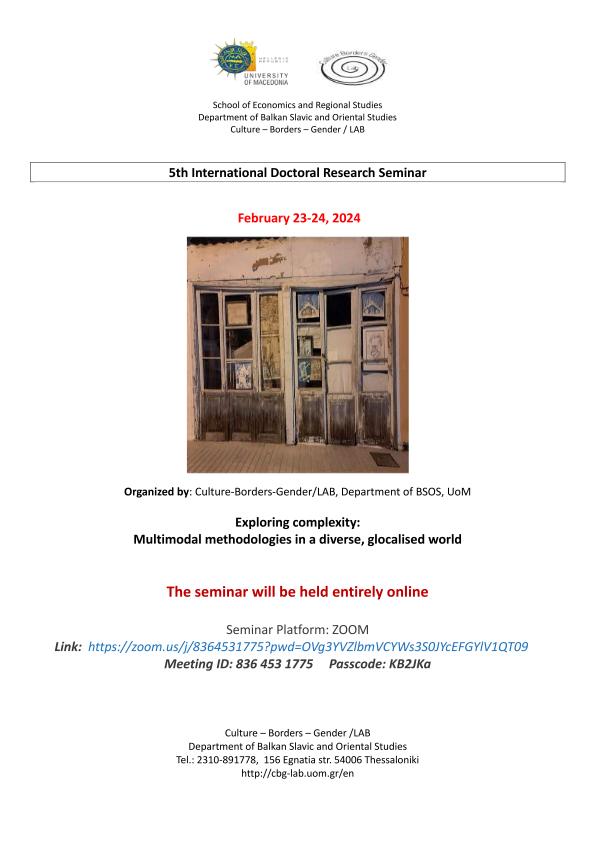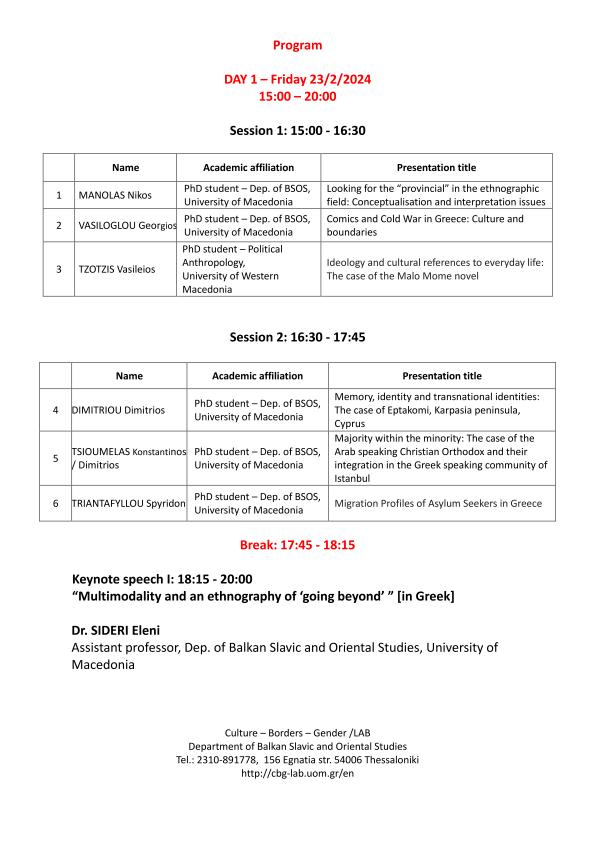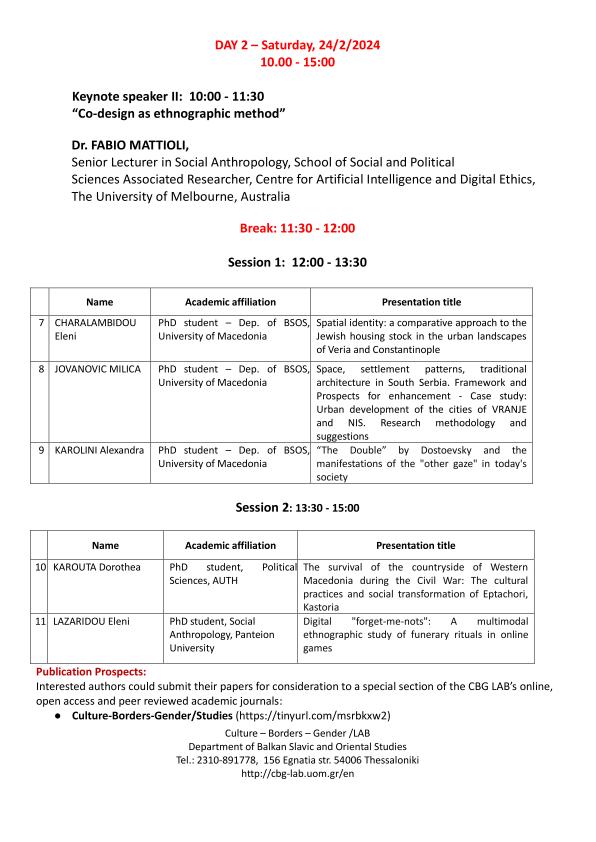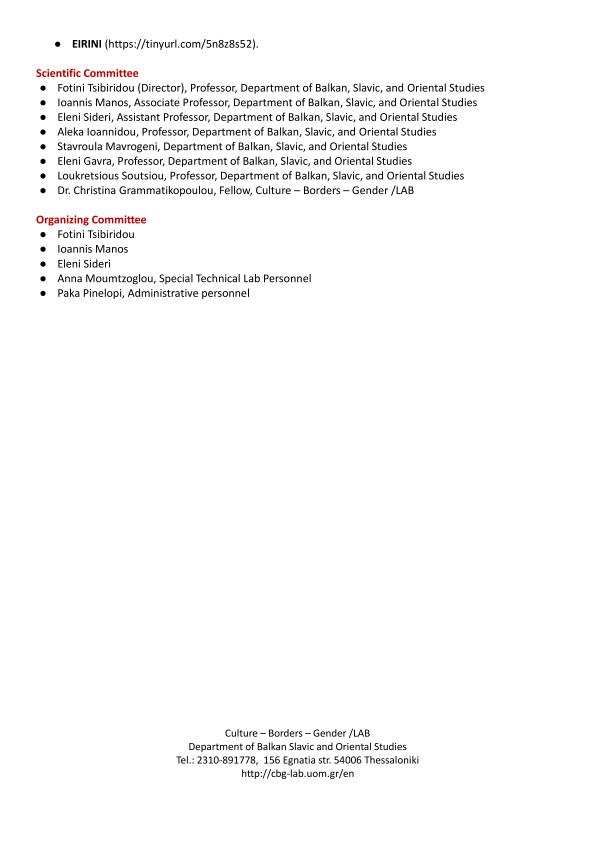Signing a cooperation agreement
 admin
admin
European Anthropology Days in Greece | 2024
The Association of Social Anthropologists of Greece (SKAE / ASAG) celebrates European Anthropology Days from the 15th of February up to the 20th of March under the rhetorical question “Is Anthropology present?“. Anthropology, in its polyphonic, open and critical approach, can contribute decisively to highlighting social problems, mitigating their causes and amplifying the voices of those affected. Anthropology enables new paths of understanding and can inform new policies and alternatives, evidence-based practices and shared visions.
Our celebrations include four movie screenings, four workshops, two performances, one exhibition and an online event held in English (link to access provided below) as well as six dedicated blog posts on ΣΚΑΕ/ASAG’s website. We are collaborating with the Ethnographic Film Festival in Athens, Fiji, Anthropology-inspired Storytelling network in Volos, Panteion University of Social and Political Sciences (Athens), the University of Thessaly (Volos), the University of Macedonia (Thessaloniki), the Aristotle University of Thessaloniki, the University of Aegean, four K-12 schools in Piraeus, Korydallos, Athens and the island of Amorgos, and a cinema club based on Amorgos. Our planned activities are outlined below.
Culture-Borders-Gender/Lab of Dept of Balkans, Slavic and Oriental Studies, University of Macedonia, Thursday, 14th of March, (18:00-20:00) “Multiple gazes towards Northern Greek province: Kalampaki’s “Kourbani” custom and the critical ethnographic encounter”, Foteini Tsibiridou, professor of Social Anthropology and director of Lab, Dimitris Kataiftsis, teaching associate in Social Anthropology, Nikos Manolas, PhD candidate in Anthropology, Anastasia Mitropoanou, MA student in Anthropology (Balkan, Slavic and Oriental Studies department – University of Macedonia) https://cbg-lab.uom.gr/en/
zoom link: https://us06web.zoom.us/j/84454977279?pwd=pALbkousabbfjetVU410D3UMbA4bHb.1
Etnographies of the Caucasus. Female Genalogies and Multimodal Methodology
Basic Research-Cycle H’, Research Commitee University of Macedonia, 2023-2024
Eleni Sideri Principal Investigator
Three generations of women-creators of Georgian cinema belonging to the same family will form the basis for this research which aims to highlight the concept of memory and history through lived experiences and artistic creation as well as their conceptualization through the category of genealogy. Second, by priming a female genealogy, from grandmother to granddaughter, in an area of patriarchal social organization such as the Caucasus, research will shed light on the ways in which genealogy can be produced over or in addition to substantive and biological constraints and reasons, through imaginative ways of artistic creation in conversation with other European currents and networks despite the ideological anchorings of the Cold War or the regional inequalities resulting from post-socialist Europeanization. Thirdly, the research will explore the concept of the auteur which, since the 1960s, has been identified with a transnational film production, ‘European cinema’, which penetrated the ideological wall of the Cold War, but had clear gender and class characteristics. It will also examine how these three female creators enrich and expand the concept of the creator as gendered historical and artistic subjects producing new social and cultural interpretations. Finally combining, through multimodality, different research methods (bibliographic research, interviews, film analysis, autobiographical texts etc.) the limits of ethnography will be explored in relation to a story that penetrates the past of ideological walls to talk about the present of Europeanization and Europeanness. The research will seek answers indicatively to the following:
1. In what mnemonic/material/emotional ways are female genealogies reproduced?
2. In what ways do these genealogies produce the concept of territory that is often used to frame a framework for analyzing historical experiences and cultural memory?
3. How does multimodal ethnography that combines discourse, film footage, and lived experiences weave between fiction and ethnographic narrative and how can it bring to the surface discourses, memories, and feelings that have been marginalized from national memory and history?
CHALLENGES AND INNOVATIVE CHANGES IN RESEARCH ETHICS REVIEWS (CHANGER)
The members of the Culture-Borders-Gender Laboratory, associate professor in Social Anthropology Dr Ioannis Manos and Dr Georgia Rina, participate in the HORIZON project titled “CHALLENGES AND INNOVATIVE CHANGES IN RESEARCH ETHICS REVIEWS [CHANGER].” This cutting-edge project started in January 2024 and will finish in December 2027, it has no sibling projects and is set to transform the landscape of research ethics fundamentally. CHANGER is designed to promote innovative changes in research ethics reviews, enhancing the ability of researchers and Research Ethics Committees (RECs) to navigate the ethical dimensions of new technologies and research practices. The overarching objective is to:
– Strengthen researchers’ capacities in ethical decision-making;
– Support RECs in addressing emerging challenges;
-Train ethics experts;
-Inform policy decisions to ensure research aligns with ethical standards.
We collaborate with a diverse team of specialists comprising social, biomedical, and natural sciences ethics experts. Our partners are or have been RECs members in both EU and non-EU countries, members of National Ethics Councils/Committees worldwide, and external ethics experts for the European Commission.
Research action-field exercise (December 2023)
Public Anthropology and Critical Ethnography. Folk Rituals in the province of Drama and the challenges of the Intangible Cultural Heritage, run by the Culture-Borders-Gender/LAB in collaboration with the Educational Cultural Association of Kalambaki-Drama (Pr. Athanasia Theodoridou). Research team: F. Tsibiridou (Scientificly Responsible), D.Kataiftsis, N. Manola, A. Mitropanou
ANNOUNCEMENT
PROGRAM ADJUSTMENT
4th Cycle of ETHNOGRAFEIN Online Educational Seminars (2023-2024)
“Borders and boundaries revisited:
Anthropological perspectives and public engagement”

Performance oikade (Aleksandros Plomaritis)
[provided by Dr. Christina Grammatikopoulou]
The seminars of the 4th Cycle of Ethnografein (2023-2024) that were scheduled for March 11 and April 1, 2024 will not take place and the lecture schedule is adjusted as follows:
8 April 2024
“The Georgian-Russian Border: Perspectives from the Periphery”
Florian Muehlfried
Professor for social anthropology at Ilia State University (Georgia)
15 April 2024
“ΝΕΑ ΜΟΔΑ-НОВА МОДА-NEW FASHION:
Materialities, cultural performances and crosslocations
on the border between Greece and North Macedonia”
Ιoannis Manos
Associate Professor, Department of Balkan, Slavic and Oriental Studies, University of Macedonia
22 April 2024
“Actions from below and exit from the Cypriot liminality”
Pafsanias Karathanasis
PhD in Social Anthropology
Abstracts – CVs
8/4/2024
Florian Muehlfried: The Georgian-Russian Border: Perspectives from the Periphery
In my presentation, I will trace the transformation of the border between Georgia and Russia from soft to hard based on the example of the Georgian highland region Tusheti. After the breakdown of the Soviet Union, the border region was managed flexibly and “from below”. This was followed by an internationalisation of border guarding and attempts to its spiritual fortification. These three phases of border guarding can be related to three different models of the state, and of being a citizen.
Florian Mühlfried is a Professor of Social Anthropology at Ilia State University. His publications include the monographs Mistrust: A Global Perspective (2019) and Being a State and States of Being in Highland Georgia (2014), the edited volume Mistrust: Ethnographic Approximwations (2018), as well as the co-edited volumes Sacred Places, Emerging Spaces: Religious Pluralism in the Post-Soviet Caucasus (2018) and Exploring the Edge of Empire: Soviet Era Anthropology in the Caucasus and Central Asia (2011).
15/4/2024
Ioannis Manos: ΝΕΑ ΜΟΔΑ-НОВА МОДА-NEW FASHION: Materialities, cultural performances and crosslocations on the border between Greece and North Macedonia
The regions of Florina (Φλώρινα) and Bitola (Битола), situated along the border between Greece and North Macedonia, constitute border locations where various and simultaneous economic, political, cultural, and social processes coincide. Amidst these processes, hegemonic discourses with different temporalities collide, various social practices with significant material implications are articulated, and multiple communities are constructed, signified, and experienced. These processes manifest across multiple fields of action and interact with each other or coexist concurrently in the same geographical space without necessarily being interlinked. This presentation uses the Florina and Bitola frontier region to explore the interplay between cultural performances and geopolitical borders.
This borderland is approached as a crosslocation, where different classificatory logics and asymmetric forms of power compete to impose their meanings on the significance and value of a place. While the two regions are politically and economically separated by distinct border regimes, including those between nation-states, EU boundaries, and the Schengen zone, they are also geographically, culturally, and historically interconnected. The presentation draws upon ethnographic material to discuss how border populations dynamically and actively produce varied experiences of the place through cultural performances, including language, dance, song, and music.
Ioannis Manos (imanos@uom.edu.gr) is an Associate Professor of Social Anthropology of the Balkans at the Department of Balkan, Slavic and Oriental Studies, University of Macedonia, Thessaloniki, Greece. He studied History and Archaeology at the Aristotle University of Thessaloniki and Social Anthropology in Hamburg, Germany and Sussex, Great Britain. He holds a Certificate in Social Research Methods from the Graduate School of Social Sciences of the University of Sussex. He has worked as a Full Time Visiting Research Fellow at the Sussex European Institute. He is the Europe regional editor of the journal Teaching Anthropology (Royal Anthropological Institute, London). He is also a founding member of the academic network on Anthropology and the Balkans “Border Crossings”, a member of the Advisory Board and co-editor of its publication series. His research interests focus on SE Europe and include borders and border regions, dance and music as performative aspects of culture, nationalism and ethnicity, politics of culture and difference, migration, human and minority rights, educational structures and processes, the teaching of anthropology and the epistemology and methodology of research. His publications include chapters and articles in Greek and English edited volumes, journals and conference proceedings, and co-editing of Greek and English edited volumes.
22/4/2024
Pafsanias Karathanasis : Actions from below and exit from the Cypriot liminality
The presentation draws on my ongoing research experience in the divided Cypriot capital, which aspires to add a piece to our understanding of the otherwise complex Cyprus Problem. Focusing on the Cypriot division, and on the boundaries that it creates, it examines the ways in which social subjects attempt to cope with the official restrictions. These can be social, political or geographical, but they are also expressed as restrictions to the development of the imagination for a different future. Following contemporary anthropological approaches to the concept of liminality, the analysis begins from the old town of Nicosia, a liminal urban space – next to the Green Line – and attempts to place the processes taking place there in a broader context of analysis of Cypriot society within the conditions created by the controlled reconnection of the two sides after 2003. Drawing on a spatial analysis of political and cultural activities situated in the geographical and symbolic in-between, it attempts to approach the continuation of Cypriot division as the maintenance of an uncertain and precarious in-between state and proposes an interpretation of these activities as examples of efforts aimed at exiting the prolonged Cypriot liminality; efforts, that is, aimed at ‘life in Cyprus without the Cyprus Problem’, even if its official solution never comes.
Pafsanias Karathanasis holds a PhD in Social Anthropology from the University of the Aegean. His research interests include the anthropology of space and cities, visual culture, and political anthropology. Specifically, he is concerned with urban cultures and contested spaces in cities and border areas. He has conducted research on urban practices such as street art, public art, and activism, and has conducted participant observation with political and artistic groups active in Athens, and in the borderscapes of Mytilene and Nicosia. His articles have been published in academic journals and edited volumes, and he has participated in international conferences in Greece and abroad, and in the organization and scientific curation of panel discussions at conferences and festivals. He has collaborated as a postdoctoral researcher with the University of the Aegean, Panteion University, and the University of Amsterdam, as a lecturer with the University of Macedonia, as a coordinator of academic and educational activities with the Athens Ethnographic Film Festival-Ethnofest and he is a member of the Board of Directors of the Association of Social Anthropologists of Greece-SKAE.
Universities in the Shadow of Genocide: Discipline, Resistance, Decolonization
The Culture-Borders-Gender/Lab in collaboration with Decolonize Hellas is organizing an online event, which will take place on Tuesday, March 5, 2024, from 7:00 to 9:00 PM, featuring international participants. The theme of the event is: Universities in the Shadow of Genocide: Discipline, Resistance, Decolonization.
The Culture-Borders-Gender/Lab is also technically supporting the event, taking a stand against academicocide—i.e., the systematic destruction of educational and knowledge structures, especially higher education and research, aimed at erasing the ability of Palestinians to rebuild their society.
The discussion will be held online via Zoom.
Click the link below to join:
https://l.facebook.com/l.php?u=https%3A%2F%2Fzoom.us%2Fj%2F2668276697%3Fpwd%3DUHNNNElkSW1qaEh1V3dMQlJaZHlkUT09%26fbclid%3DIwAR3MUL62lz6IZxYeIMr_MlW2mJgMe8E5wezzpkEWuELAEs8rIGlaQek4paQ&h=AT16uUNN_YkO4ZDoxloqP4h2aqG3QMUIJbC3rBY2smsUcCxqXHTaenZ8DmlTRlSZTeOgsXwK8wMfkIKiboan6q0TN93KXzMlmxlX5zB2YAvz0JAIuVFe0bgprnW943iHj-nu&tn=q&c[0]=AT1qWV6i1ekmS2axnT34B2XIvdMSqRM91DDT93SKzNTenr9_bqelhBA8Mtb73HLj4vVXidovXNinVec8a1DNduy3VFZOX5viq19Hxre0V4-sFT7Zc9WvAa-HQdYMiE_xMnp8JKEgS8lgY41zjxHPbyZuqQWl

6th seminar of the 4th Cycle of ETHNOGRAFEIN Online Educational Seminars (2023-2024)
ETHNOGRAFEIN
Critical dialogues, epistemological challenges,
field experiences, creative texts
“Borders and boundaries revisited:
Anthropological perspectives and public engagement”

Performance oikade (Aleksandros Plomaritis)
[provided by Dr. Christina Grammatikopoulou]
The online seminars series ETHNOGRAFEIN, since its inception in the spring of 2021, aims to contribute to a critical and interdisciplinary discussion about the theory and practice of ethnography, the epistemology of research, the significance of embodied experience, and also the modes of dissemination of the anthropological knowledge produced to both academic and non-academic audiences. The anthropological endeavour, both as a mode of research practice and a form of political writing, is based on the fundamental epistemological premises of critical evaluation, empathy, reflection, and self-referentiality and highlights the significance of a multifaceted analysis for the understanding of the local to the global.
Organisation and coordination: Fotini Tsibiridou – Ioannis Manos – Eleni Sideri
“Borders and boundaries revisited:
Anthropological perspectives and public engagement”
The 4th period of the ETHNOGRAFEIN online seminars, starting in October 2023 with the title “Borders and boundaries revisited: Anthropological perspectives and public engagement“, sets the study of geopolitical borders as its point of departure to examine the diverse phenomena and processes that abound in the contemporary state border regions and have multilevel consequences for the border populations.
By definition, studying borders and boundaries involves exploring the relationship between the ‘inside’ and the ‘outside’, or the “Self” and the “Other”. However, this is not a study of clear-cut dichotomies but an analysis of the interplay of multiple, multilevel, coexisting, but not necessarily interconnected processes. Boundaries are configured and take shape within a historically determined frame. They are subject to transformations in socio-political and economic contexts and are characterised by institutionally organised asymmetrical power relations. The complex making of borders and boundaries often emerges as a continuous interaction between mobility and enclosure, communication, coexistence, exchange, interaction, sameness and otherness, separation, exclusion, segmentation, connection and disconnection.
The anthropological study of geopolitical borders and their populations by anthropology was systematised in the mid-1990s. It was initially based on two paradigms: the study of the USA-Mexico and European borders. Nowadays, analysing social phenomena and cultural processes concerning borders and boundaries transcends disciplinary boundaries. Novel approaches such as the crοsslocations framework and the current discussion on decolonising methods and epistemologies have expanded the analytical and conceptual significance of the concepts of border and boundary. New methodological and interpretative tools have been created to study politics, trans-border mobility, materiality, transnationalism, topologies and genealogies of migration and refugeeness, border economics, and nation-state policies concerning spatial and cultural diversity, minority rights, and performative culture.
Based on detailed explorations of ethnographic research and anthropological insights, the 4th cycle of the ETHNOGRAFEIN online seminars critically examines the theoretical, epistemological and methodological complexities surrounding the study of geopolitical borders and their imposed dichotomies. Moreover, it discusses anthropology’s potential to bring forth the subtleties of human voices often overshadowed by macro narratives and create an inclusive, comprehensive dialogue in the public sphere that demonstrates the multiplicity of lived experiences.
26 Ferbuary 2024
“Transgressing Realities: Desire and Borders in Southern Balkans”
Rozita Dimova
Social Anthropologist, professor, Prof. Dr. Rozita Dimova, Institute for Advanced Studies (iASK), Kőszeg Center for Interdisciplinary and Advanced Studies, University of Sts. Cyril and Methodius, Skopje
26/02/2024
Rozita Dimova: Transgressing Realities: Desire and Borders in Southern Balkans
In my presentation, I explore the productive role of borders in the Southern Balkans, specifically focusing on hotel-casinos and beauty consumption practices in the Greece-North Macedonia border region. Gamblers who frequent Macedonian casinos use gaming as a means to break free from rigid class constraints imposed by their rural backgrounds in Northern Greece. Financial privilege allows them special treatment, turning gambling into an escape that enables them to reinvent themselves within a new reality. For urban consumers from Thessaloniki, the border provides access to affordable beauty services in Gevgelija, which enables them to reclaim their femininity and middle-class status. This raises questions about how crossing the border influences gender and class perceptions, and intersects with other consumer elements like luxury, comfort, and status, all of which contribute to redefinition and transgression of their “old” selves.
Rozita Dimova, PhD (Stanford, 2004) is a Social Anthropologist with a distinguished record of achievements, including the prestigious Robert Texture Award for Outstanding Creativity in Anthropology. Rozita has held research positions at prominent institutions, including the Max Planck Institute for Social Anthropology in Halle (2003-2006), Free and Humboldt Universities in Berlin (2007-2015), and served as an Associate Professor in Southeast European Studies at Ghent University in Belgium (2013-2020). A Founding and Permanent Board Member at the Center for Advanced and Interdisciplinary Research at the University Sts. Cyril and Methodius in Skopje, North Macedonia, Rozita is currently also a Research Fellow at the Institute for Advanced Studies in Kőszeg, Hungary. Her research portfolio includes materiality, consumerism and aesthetics, ethno-nationalism, borders and migration studies. A prolific author, Rozita is the author of the monographs, Ethno-Baroque: Materiality, Aesthetics, and Conflict in Modern-day Macedonia (Berghahn, 2013) and Border Porosities: Movements of People, Objects, and Ideas in the Southern Balkans (Manchester University Press, 2021).
Only those participants who wish to receive certificates of attendance register in the following form: https://forms.gle/6vVWdrM3HKLSLfAF9
The registration form will receive answers one week before the seminar.
The seminars are held on Mondays from 16:00-18:00
————————————————————————–
Seminar Platform: ZOOM
Link https://zoom.us/j/8364531775?pwd=OVg3YVZlbmVCYWs3S0JYcEFGYlV1QT09
Meeting ID: 836 453 1775 Passcode: KB2JKa
5th seminar of the 4th Cycle of ETHNOGRAFEIN Online Educational Seminars (2023-2024)
ETHNOGRAFEIN
Critical dialogues, epistemological challenges,
field experiences, creative texts
“Borders and boundaries revisited:
Anthropological perspectives and public engagement”

Performance oikade (Aleksandros Plomaritis)
[provided by Dr. Christina Grammatikopoulou]
The online seminars series ETHNOGRAFEIN, since its inception in the spring of 2021, aims to contribute to a critical and interdisciplinary discussion about the theory and practice of ethnography, the epistemology of research, the significance of embodied experience, and also the modes of dissemination of the anthropological knowledge produced to both academic and non-academic audiences. The anthropological endeavour, both as a mode of research practice and a form of political writing, is based on the fundamental epistemological premises of critical evaluation, empathy, reflection, and self-referentiality and highlights the significance of a multifaceted analysis for the understanding of the local to the global.
Organisation and coordination: Fotini Tsibiridou – Ioannis Manos – Eleni Sideri
“Borders and boundaries revisited:
Anthropological perspectives and public engagement”
The 4th period of the ETHNOGRAFEIN online seminars, starting in October 2023 with the title “Borders and boundaries revisited: Anthropological perspectives and public engagement“, sets the study of geopolitical borders as its point of departure to examine the diverse phenomena and processes that abound in the contemporary state border regions and have multilevel consequences for the border populations.
By definition, studying borders and boundaries involves exploring the relationship between the ‘inside’ and the ‘outside’, or the “Self” and the “Other”. However, this is not a study of clear-cut dichotomies but an analysis of the interplay of multiple, multilevel, coexisting, but not necessarily interconnected processes. Boundaries are configured and take shape within a historically determined frame. They are subject to transformations in socio-political and economic contexts and are characterised by institutionally organised asymmetrical power relations. The complex making of borders and boundaries often emerges as a continuous interaction between mobility and enclosure, communication, coexistence, exchange, interaction, sameness and otherness, separation, exclusion, segmentation, connection and disconnection.
The anthropological study of geopolitical borders and their populations by anthropology was systematised in the mid-1990s. It was initially based on two paradigms: the study of the USA-Mexico and European borders. Nowadays, analysing social phenomena and cultural processes concerning borders and boundaries transcends disciplinary boundaries. Novel approaches such as the crοsslocations framework and the current discussion on decolonising methods and epistemologies have expanded the analytical and conceptual significance of the concepts of border and boundary. New methodological and interpretative tools have been created to study politics, trans-border mobility, materiality, transnationalism, topologies and genealogies of migration and refugeeness, border economics, and nation-state policies concerning spatial and cultural diversity, minority rights, and performative culture.
Based on detailed explorations of ethnographic research and anthropological insights, the 4th cycle of the ETHNOGRAFEIN online seminars critically examines the theoretical, epistemological and methodological complexities surrounding the study of geopolitical borders and their imposed dichotomies. Moreover, it discusses anthropology’s potential to bring forth the subtleties of human voices often overshadowed by macro narratives and create an inclusive, comprehensive dialogue in the public sphere that demonstrates the multiplicity of lived experiences.
12 February 2024
“Everyday Diplomacy and Crossing Boundaries: Case of Georgia”
Ketevan Gurchiani
Professor of Anthropology, Ilia State University, Tbilisi, Georgia
12/2/2024
Ketevan Gurchiani: Everyday Diplomacy and Crossing Boundaries: Case of Georgia
In her talk Ketevan Gurchiani analyzes the practices of boundary crossings that are shaped by everyday diplomacy. Based on an example from a village, she discusses how religion, the main dividing line between groups, becomes a site of boundary crossings. The research shows how everyday peace is constantly reaffirmed through the tradition of inviting Muslim godparents to baptize Christian children. These practices also find their continuation in urban milieus. The city provides religious and non-religious buffer zones where dividing lines are easily blurred. The talk explores tactics people employ in their everyday lives to allow for peaceful coexistence, but also imbalances this kind of everyday diplomacy entails.
Ketevan Gurchiani is a professor of anthropology at Ilia State University in Tbilisi, Georgia. She is particularly interested in the domesticated and non-domesticated nature of the city, materiality and religion, and informal practices of resistance. Ketevan Gurchiani is also involved in research projects that focus on diversity, migration, and peace practices. Her most recent publications include A Gallery of Ghosts: Death and Burial in Lands Marked by Trauma, Material Religion (with Catherine Wanner, Zuzanna Bogumił, Sergei Shtyrkov) and Die verborgene Macht der Bäume. Urbaner Widerstand in Tiflis. In: Verdeckter Widerstand in demokratischen Gesellschaften in Frankfurter Beiträge zur Soziologie und Sozialphilosophie (2022)
Only those participants who wish to receive certificates of attendance register in the following form: https://forms.gle/zNpUFtrY5Rrvhh6i9
The registration form will receive answers one week before the seminar.
The seminars are held on Mondays from 16:00-18:00
————————————————————————–
Seminar Platform: ZOOM
Link https://zoom.us/j/8364531775?pwd=OVg3YVZlbmVCYWs3S0JYcEFGYlV1QT09
Meeting ID: 836 453 1775 Passcode: KB2JKa




